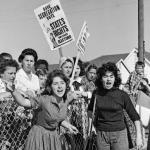Also from Tuesday’s election reactions: “1 in 3 ‘evangelical’ or ‘born again’ Christians supported a right to abortion in Ohio.”
John Fea writes: “An NBC news exit poll shows that 32% of white ‘evangelical’ or ‘born again’ Christians voted to enshrine the right to an abortion in the Ohio constitution. As expected, 68% of white evangelicals opposed the measure, but I was surprised at just how many evangelicals supported it.”
 I am not surprised. This is about as unsurprising as it gets. We have 40+ years of polling on white evangelical attitudes toward abortion with different pollsters asking the questions in a host of different ways and the results of all of that polling have been remarkably consistent. A third of white evangelicals are pro-choice. Sometimes it’s like 30%, sometimes it’s 36%. But it’s always right around a third. Year after year, decade after decade. I would have been very surprised if this NBC exit poll had found anything different.
I am not surprised. This is about as unsurprising as it gets. We have 40+ years of polling on white evangelical attitudes toward abortion with different pollsters asking the questions in a host of different ways and the results of all of that polling have been remarkably consistent. A third of white evangelicals are pro-choice. Sometimes it’s like 30%, sometimes it’s 36%. But it’s always right around a third. Year after year, decade after decade. I would have been very surprised if this NBC exit poll had found anything different.
This is an unsurprising something that we have seen demonstrated for almost a generation: Two-thirds of white evangelicals are corrosively wrong about abortion. But only two thirds.
NBC’s poll apparently didn’t attempt to gauge how Ohio Catholics voted on the abortion rights proposal, but I would be extremely surprised if the result to that question was anything far afield from 50-50 support. That’s the other reliably consistent finding from all those decades of opinion-polling on abortion. Something like half of American Catholics support abortion rights.
Periodically, these unchanging poll results catch the eye of some white evangelical or Catholic “authority” and they briefly expend a lot of energy attempting to True Scotsman-away such findings, hoping to show somehow that 100% of real, true evangelicals or Catholics support criminalizing abortion. They’ll commission new polls trying to filter out the illegitimate faux believers by factoring in church attendance or daily devotional practice or some other proxy that would show that no one can possibly really be evangelical/Catholic unless they vote Republican, but those efforts always fizzle out when these new polls come back with results that show that roughly one third of white evangelicals and one half of Catholics think that criminalizing abortion is both immoral and unwise. (Because it is.)
Generations of relentless teaching have made it clear that any expression of this belief is not acceptable in those communities and that support for criminalizing abortion is mandatory dogma for all white evangelicals and all American Catholics. And yet none of that aggressive, constant, emphatic propaganda has altered those consistent poll results.
I’ve written about this quite a bit previously. See, for example:
- LifeWay Research gets it backwards on abortion (2015)
- What do the purple people want in PRRI’s abortion poll? (2013)
- Key findings about religion and ‘abortion’ politics (2020)
- Piece of string? I’m a frayed knot (2019)
From that last one:
Many who regard themselves as white evangelical “leaders” will refuse to believe these survey responses. It strikes them as impossible that one third of evangelicals believe abortion should be legal because they’ve never heard anyone they would regard as a legitimate evangelical say such a thing.
Well, duh. Evangelicals aren’t allowed to say such a thing. When you spend massive amounts of time and energy informing people that you absolutely will not be able to handle it well if they say X, they’re unlikely to say X, out loud, where you’ll ever hear it.
Because, again, you’ve made it clear that they cannot trust you to hear it. You’ve made it clear that you will not listen to them — that instead you will seek to punish them for telling you.
And, on that note, here again is my John Howard Yoder story (originally posted along with my Harry Thomas story):
Back in the 1990s, I had what I then considered the great honor and privilege of driving John Howard Yoder to the Philly airport. At the time, this was a personal high point — the opportunity to converse with a profound theologian whose books had challenged me and influenced my thinking in a major way. Yoder’s The Politics of Jesus was a powerfully important book in my life, but for most of the ride we discussed, instead, the Anabaptist/Baptist understanding of ordination that Yoder laid out in The Fullness of Christ. I mentioned that book, citing one part of his discussion as significant to me, and the great theologian was off to the races on the subject — to my delight. My only regret was that I was unable to take notes while driving.
Later — many years later — I learned that even back then, the allegations of what was delicately euphemized as “inappropriate behavior” by Yoder were already an open secret, widely circulated and widely known. But I hadn’t known because I wasn’t someone who could be trusted to be told.
I was, rather, very much exactly the sort of person who could not be trusted and could not be told. Because I worked for Evangelicals for Social Action and for Ron Sider. I was, that is to say, a pro-lifer and an anti-abortionist — an adamant advocate of the assertion that women could not be trusted and must not be trusted. Trusting women, we insisted, was the source of the greatest moral evil of our time and we were unwaveringly committed to changing American law to ensure that such unworthy-of-trust women were legally forbidden to make decisions for themselves. Emphasizing the inconstancy and untrustworthiness of women was, for us, a moral obligation and a spiritual obligation. It was our identity.
We wouldn’t have put it like that, but just because we didn’t fully understand what we were saying didn’t mean we weren’t saying it.
And so, even though many people at that point knew that Yoder was a rapist, I was not one of those people. I was not someone capable of hearing that or of knowing that.
So I drove that warped predator to the airport. I opened the door for him and carried his bags and I thanked him for the privilege.
Six degrees of separation? That sick bastard was in my passenger seat. And I didn’t know because I was too busy loudly proclaiming that I was just exactly the sort of man who couldn’t be trusted with knowing.













